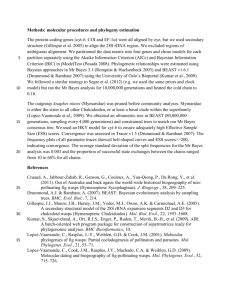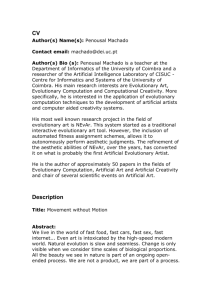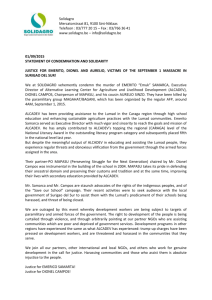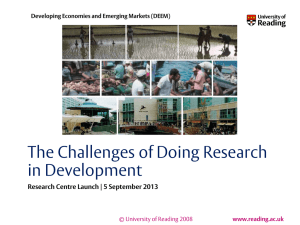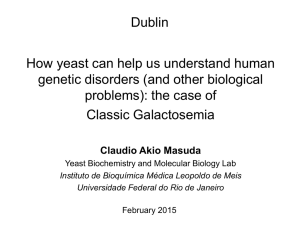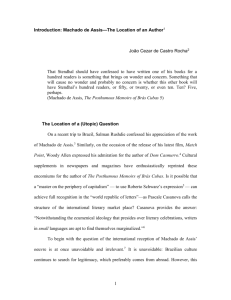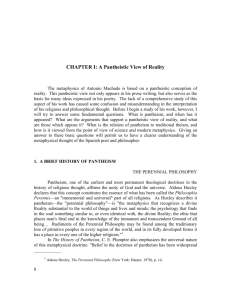A SHORT SKETCH OF THE LIFE
advertisement
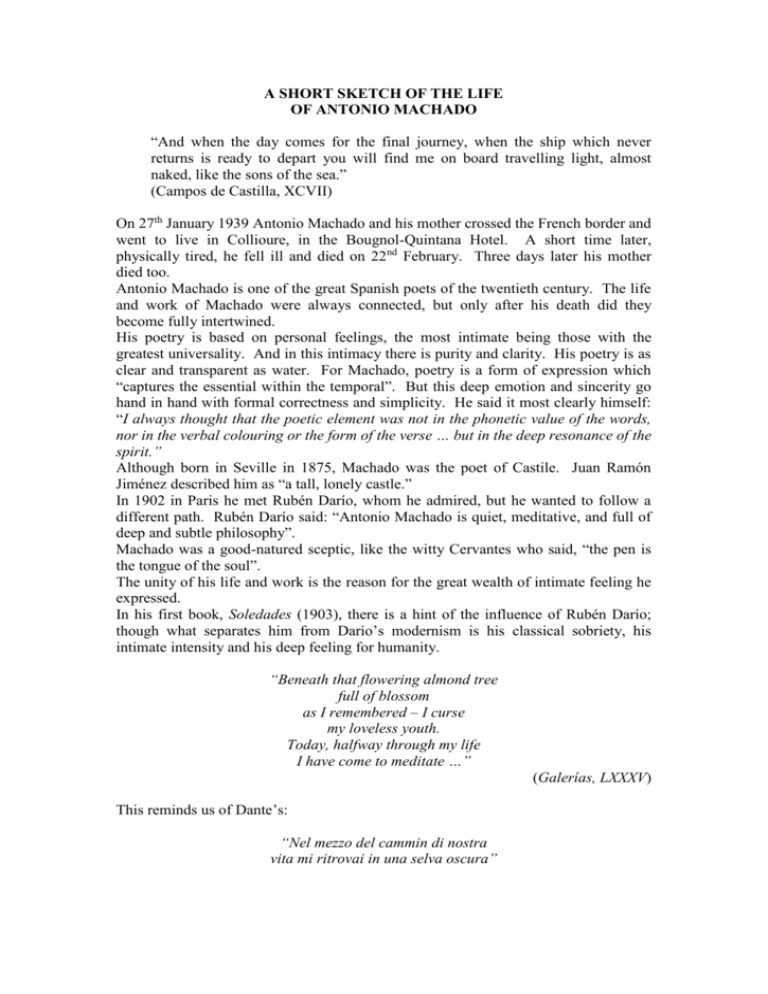
A SHORT SKETCH OF THE LIFE OF ANTONIO MACHADO “And when the day comes for the final journey, when the ship which never returns is ready to depart you will find me on board travelling light, almost naked, like the sons of the sea.” (Campos de Castilla, XCVII) On 27th January 1939 Antonio Machado and his mother crossed the French border and went to live in Collioure, in the Bougnol-Quintana Hotel. A short time later, physically tired, he fell ill and died on 22nd February. Three days later his mother died too. Antonio Machado is one of the great Spanish poets of the twentieth century. The life and work of Machado were always connected, but only after his death did they become fully intertwined. His poetry is based on personal feelings, the most intimate being those with the greatest universality. And in this intimacy there is purity and clarity. His poetry is as clear and transparent as water. For Machado, poetry is a form of expression which “captures the essential within the temporal”. But this deep emotion and sincerity go hand in hand with formal correctness and simplicity. He said it most clearly himself: “I always thought that the poetic element was not in the phonetic value of the words, nor in the verbal colouring or the form of the verse … but in the deep resonance of the spirit.” Although born in Seville in 1875, Machado was the poet of Castile. Juan Ramón Jiménez described him as “a tall, lonely castle.” In 1902 in Paris he met Rubén Darío, whom he admired, but he wanted to follow a different path. Rubén Darío said: “Antonio Machado is quiet, meditative, and full of deep and subtle philosophy”. Machado was a good-natured sceptic, like the witty Cervantes who said, “the pen is the tongue of the soul”. The unity of his life and work is the reason for the great wealth of intimate feeling he expressed. In his first book, Soledades (1903), there is a hint of the influence of Rubén Darío; though what separates him from Darío’s modernism is his classical sobriety, his intimate intensity and his deep feeling for humanity. “Beneath that flowering almond tree full of blossom as I remembered – I curse my loveless youth. Today, halfway through my life I have come to meditate …” (Galerías, LXXXV) This reminds us of Dante’s: “Nel mezzo del cammin di nostra vita mi ritrovai in una selva oscura” But more than this feeling of solitude and regret for lost youth (which was already familiar in the work of the poet Bécquer) there is a great sense of abandonment. “My soul, what have you done to your unfortunate garden?” (Galerías LXVIII) Already in his first poems we can see a melancholic nostalgia for his childhood, because children are easily given to dreaming. “The joy of children in the nooks of dead towns! … something that was once our own, that we yet see wandering through these old streets!” (Soledades, III) In 1907 he arrived in Soria. He was 31, and it was in this town in Castile that Machado found the inspiration for his best poems: “Five years in the Sorian countryside, that place which is sacred to me – there I got married, there I lost my wife, whom I loved dearly; - I turned my eyes and heart towards that place which captured the essence of Castile.” In Campos de Castilla (Lands of Castile, 1912) he speaks of the landscape of Soria: “Cold Soria, clear Soria headland of Extremadura…” (Campos de Castilla, CXIII) There is an austere emotion bordering on the tragic, as in his visionary poem ‘On the Banks of the Duero’: “Wretched Castile, once powerful and now wrapped in rags, disdaining all she ignores is she waiting, dreaming or just asleep?” (Campos de Castilla, XCVIII) Here there is a forewarning of the problems of Spain in 1898. Like Miguel de Unamuno, Machado dealt with the problem of Spanish decadence. The five years in Soria were sacred for him. When he met Leonor, she was 13, and two years later on July 13th 1909 he married her. They could not go to Barcelona on their honeymoon because the events of the ‘Tragic Week’ prevented the train from getting through. On August 1st 1912 Leonor died of tuberculosis and henceforth her memory lived with him always. “One Summer night - the balcony door was open, and my house door too Death entered my house. Slowly, Death approached her bed - not even noticing me and with soft delicate fingers broke something very fragile. Silently, Death passed by once more without even a glance. What have you done? Death did not answer. My little girl was calm, my heart in pain. What Death cut was a thread between us” (Campos de Castilla, CXXIII) Pessimism and sadness, a variation on the feeling of love, are the things that bring him close to Leonor and both of them close to the Sorian landscape: “Leonor, can’t you see, the poplars of the riverbank with their still branches?” (Campos de Castilla, CXXI) Faced with this real human sadness, Machado turns to the realm of dreaming: “My heart yearns too, for light and life, for another miracle of springtime.” (Campos de Castilla, CXV) Being a poet of personal experience and a solitary soul, he both searches in memory and projects hope: Memory + Hope put down roots into the heart. But unlike San Juan de Cruz, sure in a living faith, Machado could not be sure of the existence of God: “Last night I dreamed I saw God and that I was talking to God; and I dreamed that God could hear me … Later, I dreamed that I was dreaming.” (Proverbios y cantares, XXI) Machado was a seeker after truth, and here we have a split between a doubting and questioning mind and a heart full of hope. “It is you who lies, Reason, speaking of what you do not feel.” Pascal said: “We do not live, but we hope to live; and being so naturally inclined to be happy, it is inevitable that we never are happy.” Although Machado only knew happiness for a brief period of his life, his heart never gave up hope. “Today is always yet to come.”
